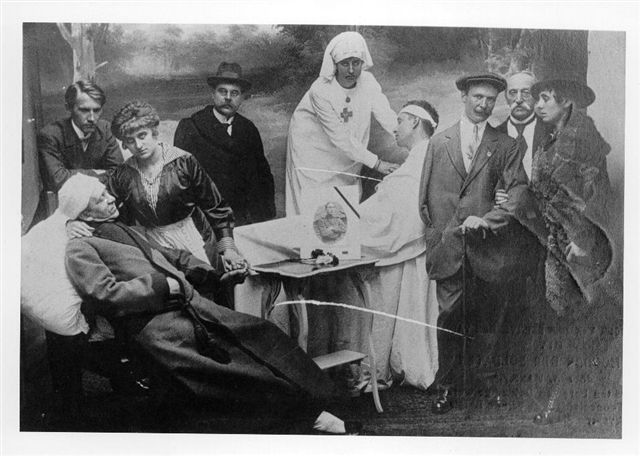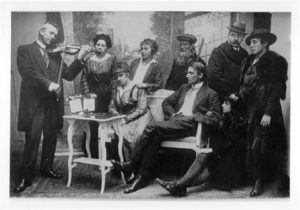The war plays of a Belgian refugee by Ad van Der Logt

Abraham Hans
Abraham Hans was a Flemish author of Dutch origin. From 1909 Hans had been a primary school teacher in Kontich, a community between the outer and inner fortifications of the Antwerp Fortress. However at the outbreak of the war the Hans family found it too dangerous to stay in Kontich. They had seen the entry of the German army into Aarschot and Leuven, nowadays know as martyr cities of the Great War. At the end of August 1914 they fled to Knokke. During this period Hans used his articles in De Telegraaf to inform the Dutch public about the First Battle of the Yser and the massacre of the German army in Roeselare (Dismal Monday, October 19, 1914). In response the Germans posted him on a black list and he fled with his family to relatives in Sluis, a village in the south of Holland near the Belgian border.
In August 1915 Hans moved to Vlissingen where he founded a new theatre troupe with mainly Belgian actors. To raise money for his countrymen he adapted his stories and novels into plays and during the war they were performed with great success in the provinces of Zealand and sometimes in the western part of Brabant. His work even made it over to England where one of his plays, The Mother of Soldiers was performed at the Oxford Theatre in London on February 18, 1917. It was part of a charity party organized by Pelabon Factories in Richmond.
Throughout his plays Abraham Hans drew on the stories of the ‘rape’ of Belgium, with Belgian characters being represented as mostly brave, patriotic men and women. The Germans, conversely, were represented as the cruel Hun (except the guards in For Freedom).
After the armistice Hans went back to Belgium. In 1920 he became a professional journalist for the Flemish newspaper Het Laatste Nieuws (The Latest News). His war experiences were recorded in the 1916 Een Vlaams gezin in oorlogstijd, (A Flemish family in wartime), De dood in Vlaanderen (1921) (Death in Flanders) and Het woud van Houthulst, of de Duitsers in Vlaanderen (Houthulst Wood, or the Germans in Flanders) (1923/24) and other works. After the Great War Hans set up a campaign for the restoration of the ‘devastated regions’ (the Yser region and the city the Ieper) using the newspaper he worked for. Till his death in 1939 he wrote nearly 200 youth novels, 120 adult novels and 745 so called ‘Hansjes’, short stories for children.
The Mother of Soldiers (1916)
Hans’ first play to be performed in The Netherlands was De moeder der soldaten (The Mother of Soldiers). The setting of this 1916 play is a village in the neighborhood of Bixschote, Passchendaele and Langemarck. In this area, east of the city of Ypres and occupied by Germans, one could hear the firing of the cannons at the Ypres-Yser canal.
The drama features five characters: the old farmer Vermeire and his daughter-in-law Jeanne, the wounded soldier August Dobbelaere and his fiancée Emerance Lieftinck and a doctor. Vermeire and the physician both have sons on the Yser front who we are told about during the play.
The beginning of the play is very important. Because of his physical condition Vermeire sleeps a lot, and he often dreams about his son Jules, Jeanne’s husband. This gives the author the opportunity to make his story known to the public. Then Vermeire and Jeanne are startled by the sound of an airplane.
Vermeire: … … where is he?
Jeanne: Father there!(The old man seeks the plane, finds him after a few moments)
Vermeire: I see him. (waves at it) Greetings … messenger of the Yser … of our boys … (sobs). O Jules, he comes from where you are. … Jules, my good, good boy … he will go to you … That pilot gives us hope and courage … Once you all return from the Yser … back as conquerors. Oh, Jeanne, I often see that day in my dream … The King and the Queen and our army back as liberators.
This scene is similar to one at the end of the play where we see the same people in a tableau vivant. In a chair is Vermeire, with Jeanne taking care of him. The Vermeires have received a letter announcing that Jules has been wounded. The play ends with the old man saying:
Jules, my boy, hurt … But the queen is with him … The mother of soldiers … She is at his bed … See Jeanne … just see …
A sister of the Red Cross, representing Queen Elisabeth, then bends over the wounded Jules. There is a photo of this tableau in which the whole company is depicted pontifically with the author behind Vermeire and Jeanne. On the table is a photo with mourning ribbon in memory of a fallen soldier.
Queen Elisabeth is shown in the play as a great example for all Belgian women. She is the Mother of Soldiers. The Belgian royal family were central to Belgian morale. A Belgian journalist even attributed the successful resistance of his compatriots on the Yser Front to the Belgian royal couple, writing:
“And we, Belgians, Walloons as Flemings, see in our monarch and our queen the personification of our holy law, and of freedom, devised by a treacherous enemy. And that the proud plans of Germany were broken at the Yser, is the work of Albert and his army, but also of Elisabeth and her staff of doctors, nurses, stretcher-bearers and other faithful servants.” (Vlissingense Courant, November 19, 1917).
In this comment King Albert as well as Queen Elisabeth were shown as equal in their attempts to resist the German occupation of Belgium: both with an army at their disposal.
Another dramatic line is the relation between August Dobbelaere and his fiancée Emerance. In the picture of the tableau vivant you can see them at the right. August has been injured in combat near Mechelen (Malines) in 1914. He has lost his right arm and is depressed and full of self-pity because of his injury, thinking that it will result in his relationship with Emerance failing. He feels that he can’t maintain her after marriage and wishes instead that he had died at the Yser and buried there among his comrades. In the play he has therefore returned to his village to break off the engagement with Emerance. Jeanne talks to August and tells him that he must be more courageous, saying that if her husband Jules were to return wounded, she would simply love him more. When Emerance appears she expresses similar ideas in the face of August’s despair:
Emerance: Silent, be quiet Gust … Jeanne told me everything, I told you. And you think so about me … Do I have nothing more to say then? You were gone when the King [King Albert] called you … You did your duty … You did not stay behind … You wept when you said good-bye to me … It was hard for us to say good-bye … do you remember the station? But you went anyway … You fought for land and people … dared your life … God spared you … you came back … and we would separate.
August (points to his mutilation):Have you seen this?
Emerance: (throws herself back on his shoulder and sobs for a moment) Poor, poor August … How must you have suffered. Oh, I’m trembling when I ponder … But God has spared you … God be believed, you’re back … And I would let you go because you were mutilated … I would withdraw myself?
August: No, no, but I must let you go, I must be the strongest.
Emerance (cheerful): And if I do not want to?
Soon Emerance changes August’s attitude and he in turn is proud of the gallant attitude of his fiancée. She then plans to hide him in a farm in the Uilenbos (Wood of Owls) until Belgium is liberated.
For Freedom (1916)
Hans’ second war play Voor de Vrijheid (For Freedom) was performed in Vlissingen, Middelburg and Zierikzee between April and September 1916. It describes the lives of the inhabitants of the East-Flemish village Leebeeke in the region between Aalst and Ninove. When mobilization is proclaimed three villagers Frans Bijts, Emiel Janssen and Julien Meulemeester have to enlist. Frans and Julien are stationed in the land of Herve (east of Liège) and have to resist the first waves of the German attack. Julien is injured, after he has heroically killed a number of Germans. He is found by the Red Cross and taken to a hospital in Eijsden in Dutch Limburg. Frans Bijts gets hurt when the powder magazine of the fort explodes. With a blackened face he is taken to a hospital in Antwerp. There he fears that he will remain blind, but after about three days his eyesight is back and he lets a nurse write a letter to his wife Alma. Emiel Janssen is stationed in the neighborhood of Tienen, but when the Belgians have to retire on August 12, 1914 he fights in the trenches along the Diest-Zillich line. The Belgian army has been set up here to resist the Germans in what is later called the Battle of Haelen, also known as the Battle of Silver Helmets. Emiel is hit by an enemy bullet and dies on his way to the hospital.
The whole military history of the three villagers is only the background of the play, because it was dramatically impossible to realize it in a play. What happens to the men is told by other characters, a method Hans used in The Mother of Soldiers. Hans also used a tableau vivant to show what happened elsewhere. What the spectators probably could see, was the planned assassination of the hostages of the villages around Ypres. The Germans thought that some of them were franc-tireurs. Eventually the hostages manage to flee and their German guards do not shoot back. Only one old man is shot.
Christmas in war time (1917)

Hans’ third war play of is Kerstmis in oorlogstijd or Kerstmis in Vlaanderen (Christmas in war time or Christmas in Flanders). It takes place in the occupied area behind the Yser front and throughout there are references to occupied Belgium. The old farmer, Lievens, sings the song of the Flemish Lion, the same song that his deported son Paul often sang. At the end of the performance the audience could see in a vision of Lievens the painted decor of the battlefield of the Yser with the burning town of Dixmude and a lonely sentry that reminded the (Belgian) public of their own sons at the front.
Other War Plays
In 1918 Hans performed with his company two more pieces: De stem van ’t hart (The Voice of the Heart) (premièred on 15 February in Middelburg) and ‘t Zijn maar loodsen (They’re just Pilots), a play in four acts (premièred on 14 October in Vlissingen). In the first play, life in Flanders before and during the first months of the war is dramatized. In the second, performed by the Theatre Department of the Belgian Trade Union, the problems of the pilots facing German mines and torpedo assaults are the central theme. At the end of both performances a collection was held for Belgian deportees and prisoners of war.
